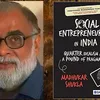From persistence to pivots – tips for social entrepreneurs from author-storyteller Elisa Birnbaum
Examples of pandemic resilience, sustainable innovation, and ecosystem partnerships are shared in the interview with this social entrepreneurship expert.
Based in Toronto, Elisa Birnbaum is the publisher and editor-in-chief of SEE Change Magazine, which has been covering social entrepreneurship for over 10 years. She is the author of In the Business of Change: How Social Entrepreneurs are Disrupting Business as Usual (see my book review here).
The 185-page book is an engaging blend of founder stories and impact analysis from 65 organisations. It combines inspiring examples, clusters of learnings, and actionable insights on social innovation.
See also YourStory’s Book Review section with reviews of over 280 titles on creativity, entrepreneurship, innovation, social enterprise, and digital transformation.
In this chat with YourStory, Elisa talks about the journey of a social entrepreneur, problem solving, and resilience in the pandemic era.
Edited excerpts from the interview:
YourStory [YS]: In the time since your book was published, what are some notable new social enterprises you have come across that extend the material in your book?
Elisa Birnbaum [EB]: Oh so many! It feels like every day there’s another social enterprise that’s launched, doing something innovative and important.
I really like watching the evolution of Lava Mae by social entrepreneur Doniece Sandoval, an enterprise that offers mobile showers and toilets to people experiencing homelessness. It started in San Francisco but has since expanded across the US and now they are even helping communities create their own products, with their help.
YS: How was your book received? What were some of the unusual responses and reactions you got?
EB: The book has received a lot of positive response, which has been so gratifying. When you put so much work into something, it’s nice to feel that it met those expectations and fulfilled its mission.
Most people were just happy to read about so many different kinds of social entrepreneurs and appreciated the focus on the lessons learned, as it provided them with valuable information in their own initiatives.
YS: How big a role does academics play in entrepreneurship? Can social entrepreneurship really be formally taught?
EB: As someone with a few degrees, I’m a fan of academics for how it teaches us to think, to analyse, to work collaboratively and learn about others. That said, I do not believe schooling is essential to entrepreneurship of any kind. I think some people are born with certain aptitude toward business, and that makes a huge difference in their capacity to be an entrepreneur.
Others can still pursue social entrepreneurship without academics but I’d highly recommend they hire someone with the skills, knowledge, and training to help them.
YS: What are the typical challenges social entrepreneurs continue to face even with such a wealth of resources and case studies available online? How can these challenges be addressed?
EB: There are a number of challenges – lack of funding being one of them, legal/policy restrictions being another of the most common. And as per the question above, lack of knowledge or understanding of business itself is huge.
For the funding issue, I think it’s a matter of being creative – and persistent. It’s really tough to look for and receive funding – even tougher today! But there are some wonderful examples of people who have succeeded. I would follow their lead, do some research, try something new. And keep going despite it all.
As for the second challenge, that’s really unique to each region or country that you live in but people have found ways to creatively work around those challenges too. Or they have become advocates for policy change – a harder approach but some have found success there too.
As for training, I usually suggest people work in business first before launching their own social enterprise. Sometimes social entrepreneurs get so caught up in the emotional mission, they forget that they will be running a “business” and that they need to understand the ins and outs if they want to succeed.
YS: What new meaning does social enterprise have in the era of the pandemic?
EB: I’m not sure it has a new meaning, to be honest. It has been and still remains a very important and valuable component of social change in society. Like other components, however, the pandemic has brought additional challenges.
Social enterprises are struggling to survive, much like non-profits and charities. And I just hope their value is recognised so that they can survive.
YS: What are some outstanding social enterprises you have come across that tackle the coronavirus pandemic impacts?
EB: I would offer the following but there are SO many!
Oliberte Shoes, a Canada-based Fair Trade social enterprise that produces sustainable shoes using material from emerging economies (and hiring employees from there as well), has pivoted to produce masks and other supplies.
Cycle Connect helps rural households living in the last mile (typically with the provision of bikes). It developed a new seed loan programme to help rural families stay food secure during these times. It also donated bikes to communities to ensure that healthcare workers could get to the frontlines in Uganda.
Citizen Schools is focused on students’ education and wellbeing. To counter the learning loss during COVID – and possible long-term effects – the social enterprise has upped its support for middle school students across the US to make it more enjoyable and compelling. It also launched virtual 'apprenticeships’ among other initiatives to keep learning alive.
YS: How should innovators strike that delicate balance between ‘Stick to your vision’ and ‘Adapt to a changed world’?
EB: Being able to pivot and be flexible has always been important to the success of social enterprises. But now, more than ever, it has become vital. I have seen social enterprises that have made pivoting their mantra and thankfully it has helped them survive.
Others who wouldn’t adapt are now on life support. That said, sticking to your vision is another quality that I have seen time and time again play a significant role in the effectiveness and success of a social enterprise. So you definitely need that too.
But I think the most successful social enterprises are able to embrace flexibility and adaptability. Persistence is key. If that means your vision might have to go through a pivot but your values and your mission remain strong, then that is the sweet spot.

Elisa Birnbaum at Hub Ottawa event
YS: Is there such a thing as the ‘ideal age’ for a social entrepreneur, or can the startup bug strike you at any time?
EB: There’s no ideal age to be a social entrepreneur just like there’s no ideal age to be a traditional entrepreneur. If you have a vision, a mission, and have the tools to make it work, go for it.
If doing it later in life, I would just make sure you have your eyes open to what it entails (then again I’d advise anyone at any age to do the same). And ensure you have people around you to support your work and to fill in the gaps you may bring to the table.
YS: It’s one thing to fail with a product, and a bigger dimension to fail with a social enterprise. How should founders regroup in these two situations?
EB: I would suggest you regroup in much the same way: take a step back, analyse what went wrong, ask yourself some tough questions, bring in an outside observer or consultant to provide an unbiased viewpoint and some valuable advice if you can afford it and start again.
The problem gets more entrenched when people continue to do the same things over and over again that aren’t working. The ability to pivot, as I keep bringing it up, is critical, and the ability to be flexible, adaptable, and versatile is critical too.
And being able to see beyond your own biases, expectations, and notions of success will help you truly see what needs to be done – and how to get there.
YS: How should founders evaluate weak signals and anecdotal evidence, which seem to contradict quantitative market trends?
EB: That’s a tough one. In that situation it’s even more critical to bring in an outside consultant, advisor or even a friend. Someone who can look at the results totally objectively, turn them upside down, and analyse them fully and completely.
At the same time, I am a strong believer that the market speaks the loudest. And that’s the reality whether you are running a social enterprise or a traditional business. If you hear people are not happy with your product or service but your numbers have never been higher, it is time to re-evaluate your reliance on anecdotal evidence and weak signals.
YS: What are the top three success factors for the government and industry to work together and grow social entrepreneurship in their countries?
EB:
1. Compromise: Every sector comes to the table with different needs and expectations, but unless they are willing to give and take to compromise, they won’t be able to make collaboration work.
2. Education: At the heart of their work together should be a real understanding for the issues that social entrepreneurship is tackling and the importance of their efforts.
3. Empathy: There is no way that any work can be done unless the people working together, regardless of the sector, actually care about the issues at the heart of the work.
YS: What is your next book going to be about?
EB: I’m not sure yet. I’ve been researching some possible areas of interest and will see what transpires and whether there’s interest from publishers. Right now I’m focused a lot on social entrepreneurship as it relates to reform of the criminal justice system and elder care.
Two very different issues, but both say a lot about how we treat the people in our societies and the world. And they both are strong indicators of the values we embrace in our communities and the choices we make for the next generation.
YS: What resources would you suggest for our readers to follow up on the social enterprise movement, including your own work?
EB: I would have to suggest my book! But I also recorded it as an audiobook recently so maybe worth a mention for those who don’t like reading! And of course my magazine and podcast where we speak with social entrepreneurs around the world.
You can find a link to the podcast on the magazine website and via iTunes directly. You can also watch our digital storytelling project, The History of Social Change, exploring social movements that changed our lives.
As for outside resources, I would check out Skoll Foundation, Acumen Academy, and School for Social Entrepreneurs.
YS: What is your parting message to the aspiring entrepreneurs in our audience?
EB: Do your research, ask questions, engage with other social entrepreneurs, read, learn. Have a mission and stick with it but make sure your eyes are fully open to the work involved and the challenges ahead.
Most importantly, don’t give up on that dream. People will tell you that you’re too idealistic, they will challenge you, they will laugh.
But, so long as you have your eyes open and have done your work, you will show them what it means to live your life to the fullest, to live it with purpose, and to effect change. And what is more important than that?
Edited by Megha Reddy












